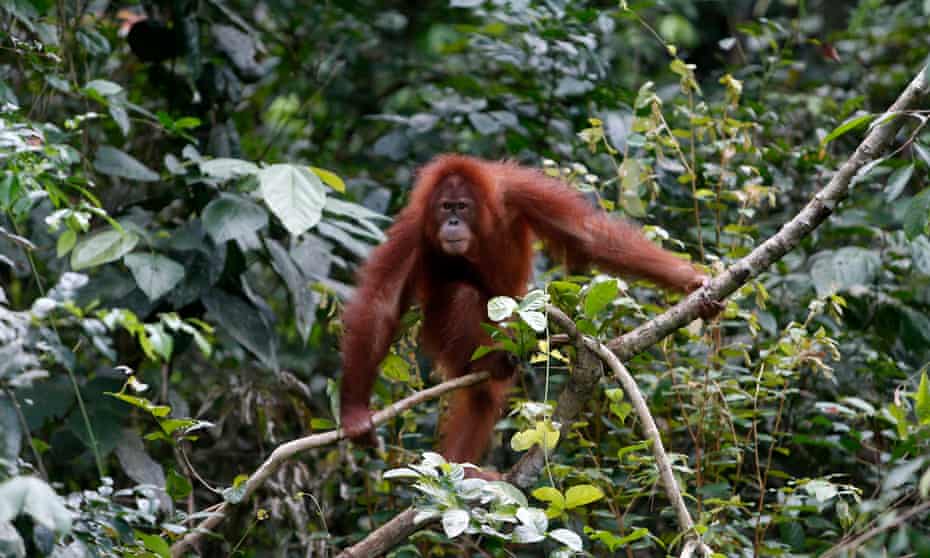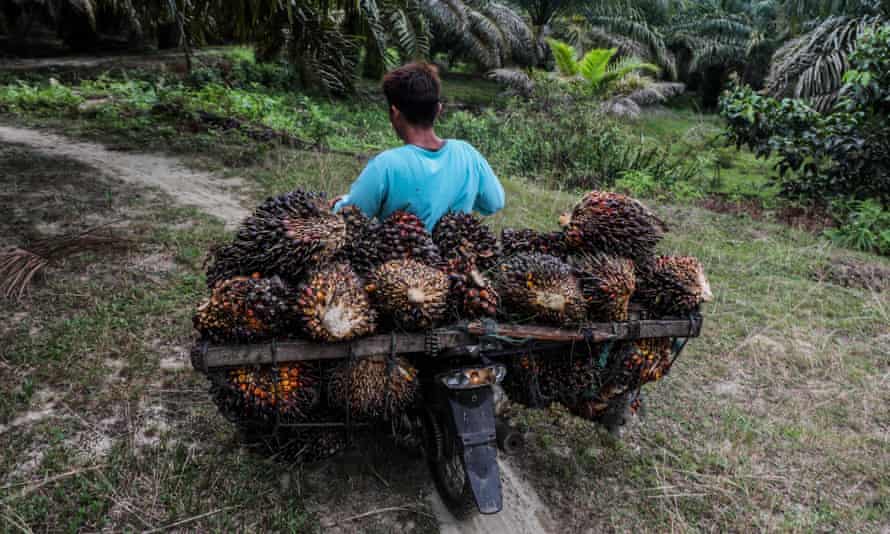Fifth of Indonesia’s palm oil sites lie in protected forests, says Greenpeace
Report says enforcement failures have led to Unesco sites and land mapped as orangutan habitat being turned into plantations

Almost one-fifth of the land used for Indonesian oil palm plantations is located in the country’s forest estate, despite a law banning such activity, according to a study by Greenpeace.
The report, produced by Greenpeace and TheTreeMap, describes a catastrophic failure of law enforcement that has allowed swathes of land, including Unesco sites, national parks and areas once mapped as habitat for orangutans and Sumatran tigers, to be turned into oil palm plantations.
Indonesia is the world’s biggest producer of palm oil, which is used in many everyday products and foods, from shampoo and lipstick to chocolate and frozen pizzas. Demand for palm oil, however, is driving the destruction of carbon-rich forests that are home to indigenous communities and crucial to biodiversity.
Of the estimated total 16.38m hectares of oil palm plantations across Indonesia, 19% are located inside the forest estate.
The analysis, produced using maps of industrial oil palm plantation concessions and satellite imagery, found that by the end of 2019, there were 3.12m hectares of oil palm plantations across the forest estate. Half were industrial oil palm plantations. At least 600 plantation companies had operations set up inside the forest estate, the study found.
The study also found that, as of the end of 2019, oil palm plantings in Indonesia’s forest estate occupied 183,687 hectares of land previously considered orangutan habitat, and 148,839 hectares of Sumatran tiger habitat.
Kiki Taufik, the global head of Greenpeace’s Indonesian forests campaign, said that instead of punishing companies, the government had offered increasingly lenient amnesties for such operations. “It’s supposed to be that [companies] are sanctioned but now they have got the red carpet out to process the illegal [activities],” said Taufik.
It is not clear what proportion of the identified plantations have subsequently been legalised.
Government policy was pushing indigenous and rural communities towards an apocalyptic future, Taufik said. “In areas where extensive forest clearance has been condoned, these landscapes are now subject to life-threatening heatwaves, frequent floodings, and during the dry season moist forest cover is now prone to annual fires.”

Very few companies have been prosecuted for illegal developments, and those that have been punished are mostly smaller companies, according to the campaign group.
The report warned that the omnibus job creation law, which was passed last year, provoking huge protests, would lead to further devastation. The legislation, which was designed to boost investment, removed various environmental and labour protections.
According to Greenpeace analysis, an amnesty introduced alongside the law could allow oil palm plantation companies that occupy a further 665,945 hectares of forest estate to legalise their operations.
The study also raised concerns about the effectiveness of initiatives that are designed to promote responsibly sourced palm oil. Greenpeace claims that 535,000 hectares of plantation in the forest estate has some form of certification including from the Roundtable on Sustainable Palm Oil (RSPO) scheme.
The RSPO is a global multi-stakeholder organisation. Greenpeace says that RSPO member plantation companies have a combined total of 283,000 hectares of oil palm planted in the forest estate.
The RSPO said its standards were voluntary and “do not extend to enforcing or confirming the legal standing of a company’s use of land (which is a mandate only held by the national authority)”. It said its standards “are adapted for use by each country through national interpretations (NI) to ensure that all RSPO standards align with the legal requirements of that particular country”.
Changes to regulations relating to permits in Indonesia would not be applied retrospectively under RSPO standards, the statement added. New or recertification audits had to have evidence of both land rights and plantation permits. “We apply the need for RSPO members to abide by the local government’s regulations in our standards and certification systems,” RSPO said.
RSPO added that “the spatial data presented by Greenpeace does not reflect the full extent of the data RSPO has received from our members’ map submission process. The RSPO Integrity Unit is of the view that RSPO has adopted good governance in data collection and uses the data to improve its monitoring”.
RSPO said it believed certified sustainable palm oil was a practical solution to industry challenges, but that government and wider industry collaboration were needed.
The ministry of environment and forestry did not immediately respond to a request for comment.